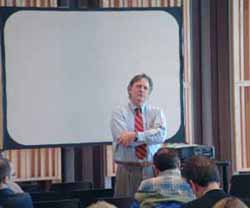Third Annual Educational Technology Summit
Promising to show post-secondary education decision makers where the "rubber meets the road" for e-learning and how advances in technology and curriculum design can enhance student achievement, the Third Annual Education Technology Summit, hosted by Teachers College, came to Morningside Heights from May 12 through 16th.
Irving Hamer, Professor at Teachers College and a conference organizer, said that the conference was important in helping to connect ideas, the best practices and the people in the field.
"Practitioners require up to date information about the developments in educational technology. Equipment, approaches, and opportunities surface very quickly in the field and to stay current requires participation in meetings such as the Summit," said Hamer. "In addition, the opportunity to learn what others are doing in similar situations is very important to the quality and character of school curricula and e-Learning services. More importantly, the convergence of practitioners, academics, and business is unique and important to the future of education."
Hosted in several rooms of the Lerner Hall Student Center on the Columbia Campus, the Ed Tech Summit boasted a broad range of software and hardware vendors, ranging from co-sponsor Dell Computers and PeopleSoft to Apple, Toshiba, Sylvan Learning Centers and many others. Speakers at the conference included many professors from Teachers College including professors Hamer, Herbert Ginsberg, Frank Moretti, Peter Cookson, and Acting President Darlyne Bailey. Other speakers included James Neal, Columbia's Vice President of Information Services; John Bailey, U.S. Department of Education's Director of Educational Technology; Peter J. Stokes, Conference Chairman and Executive Vice President of Eduventures; Craig A. Conway, President and Chief Executive Officer of PeopleSoft, Inc., and many other business leaders, educators and technology directors.
The first part of the summit, Making e-Education Pay, was geared towards decision makers from post-secondary institutions. Speakers shared with attendees their success stories, predictions and strategies for the changing landscape of education and technology.
"Education is not the commercial market, it's not the government market, it's an industry that has very dedicated, passionate people, that are doing something good in the world," said Conway, in his keynote speech. Noting the impact of the current economy, business and political climate on higher education and the mood of the country, the CEO of PeopleSoft said that while this has been a tough year, he was certain that technology could improve quality, cost effectiveness, productivity and reliability.
Acknowledging the gap between the investments made and the goals that need to be reached, Stokes of Eduventures said that it was time to look at the early leaders in the e-learning field and start learning from them. "Institutions already possess years of experiences with e-education; there have already been lots of successes, lots of mistakes, lots of lessons learned," said Stokes.
"However," added Stokes, "I think we are at an important transitional point where schools are beginning to understand the value of their technology and curriculum investments in different ways and are really begging to recognize the opportunities to extend the institutional mission with deploying and utilizing these tools."
Panel discussions and breakout sessions followed, exploring and discussing ways in which decisions and deployments, strategies and successes have been made in the e-education field.
The second portion of the conference, New Models for Individualized Instruction for the K-12 Educator, focused on the impact of technology on curriculum, testing and individualized instruction.
"Technology is fundamental to the continuing evolution of pedagogy. It is important that education policy support this evolution of pedagogy. Out of high quality pedagogy, what you get is improved student achievement, learning environments that matter and are consequential, but for me these tools are an addition to what is a two century long experience of teaching by extraordinary professionals, these tools offer up an opportunity to strengthen their pedagogy," said Hamer in a keynote speech.
Break out sessions included sessions on building school/home communities, best practice for assessing school performance, models of individualized instructions, and other forces impacting educational technology.
In discussing what he wanted participants to come away from the conference with, Hamer reiterated that "technology tools are a powerful addition to instructional pedagogy. In the hands of teachers and students they enrich the teaching and learning process."
But, he cautioned, there is much work to be done in developing the policy framework to leverage these tools justly. "Integrating the tools into instruction requires forward looking policy frameworks about ubiquitous access, content, training and development, research and evaluation, and financing," said Hamer.
For a full list of both vendors and presenters, please see: www.edtechsummit.org.
Published Tuesday, Jun. 17, 2003
